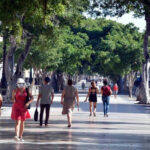On Monday, November 2, the 2020-2021 school year begins and there should the slightest opportunity to be infected with COVID-19 in educational institutions should be avoided. Where there is a breakdown of hygienic-sanitary measures, the closure of schools will be maintained.
The teaching period that is about to begin is challenging, but it can be done well, organized, with the existing measures and the experience of these months of confronting the epidemic.
The more complex schedules in schools, such as break and lunch, will be held in a staggered manner to avoid overcrowding of students and teachers.
The state sanitary inspections will continue and the investigations will include a systematic sampling of a part of the enrollment with PCR tests, in order to prevent any problems in time and give more security to the families and teachers´ staff.
For several months, specialists from the Ministry, researchers from the Central Institute of Pedagogical Sciences and members of the National Commissions for Study Plans and Programs, including professors from universities, prepared the curricular adjustments for the 2020-2021 academic year.
This includes the content over time and its integration, taking advantage of the interdisciplinary relationship, the use of other teaching aids and new ways of evaluation.
General Education will not work by semesters, or blocks of subjects. The school year will be homogeneous from November until the final exams, and only the recess weeks of December and April, after the partial evaluative cuts, will lead to a change of activities.
The responsibility is everyone’s in terms of achieving a 2020-2021 school year with positive results. Together, the school and the family must work so that strict compliance with hygienic-sanitary measures will be a permanent way of acting in all settings and reach the months of June and July with the satisfaction of concluding a different, innovative and of excellent results.




